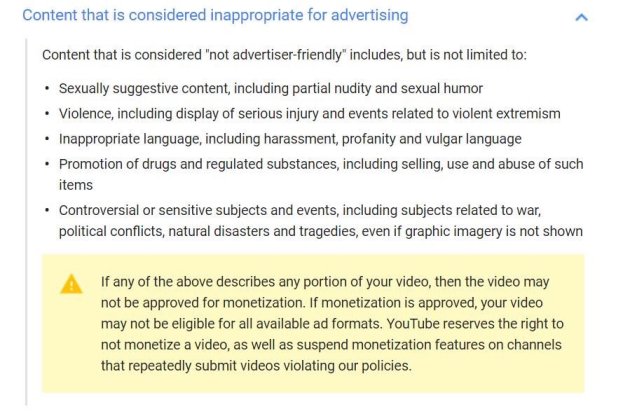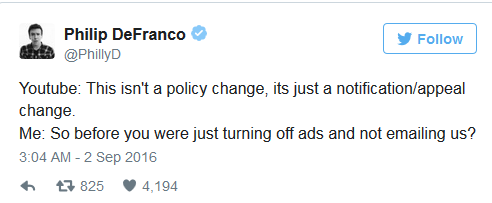
YouTube is facing strong backlash from content creators following an update to its advertising policy, which now makes it harder for content creators to monetise their videos.
The furore kicked off when the Google-owned video giant sent an email to YouTubers notifying them that one or more of their videos violate its new “advertiser-friendly content guidelines”.
According to YouTube’s terms of service, videos are considered ineligible for monetisation if they are not “advertiser-friendly”, which includes sexually suggestive content, violence, inappropriate language, promotion of drugs and controversial or sensitive subjects.

A screen shot of the email received by YouTube stars
Popular YouTuber Philip DeFranco, who has 4.5 million subscribers, is one of the voices leading the #YouTubeIsOverParty hashtag on twitter.
He said ads were disabled recently for 12 of his videos because they included “excessively strong language”, thereby running afoul of YouTube’s guidelines.
“By taking away monetization, it’s a form of censorship,” DeFranco said in a video posted Wednesday.
In the video titled ‘YouTube is shutting down my channel and I’m not sure what to do’, DeFranco said: "Since day one I have built my business out in a way that it would not matter if 100% of the people that watch have adblockers. It would not matter if YouTube stripped me of all my advertising, we will still make money, still be profitable and will still be able to make this show."
Another person wrote on Twitter: “This is the end game of allowing all your content to be swallowed up by social media ghettos.”


DeFranco believes his videos were hit for covering news events like Chris Brown’s standoff with police. His channel is mostly devoted to hard-hitting mental health issues and his videos could be stripped of advertising for his discussions of difficult topics like rape and suicide.
For professional or semi-professional YouTubers, monetisation through advertising is almost always their main source of revenue. It’s fair to say internet celebrities have helped make YouTube what it is today, but they are now facing the platform no longer be a place of free expression and also having their income squeezed.
YouTube released a statement after its community expressed frustration, pointing out these rules regarding monetisation are not new, but have been instated since 2015.
The thing that has changed is the notifications creators receive. However, with these new notifications, fears about censorship are rising with the types of videos being flagged being uneven with some channels hit harder than others.

This is not the first time YouTubers have expressed distaste with the transparency of the platforms monetisation model. Earlier this year the vblogger community found themselves unable to monetise videos with no warning whatsoever.
In the first monthly issue of AdNews, we explore how Facebook and Google are squeezing out content creators. To read the full magazine, and check out the new features, download a digital version of AdNews on desktop, Apple or Android here for $5.99. You can also subscribe to the premium print edition here.
Have something to say on this? Share your views in the comments section below. Or if you have a news story or tip-off, drop us a line at adnews@yaffa.com.au
Sign up to the AdNews newsletter, like us on Facebook or follow us on Twitter for breaking stories and campaigns throughout the day.


